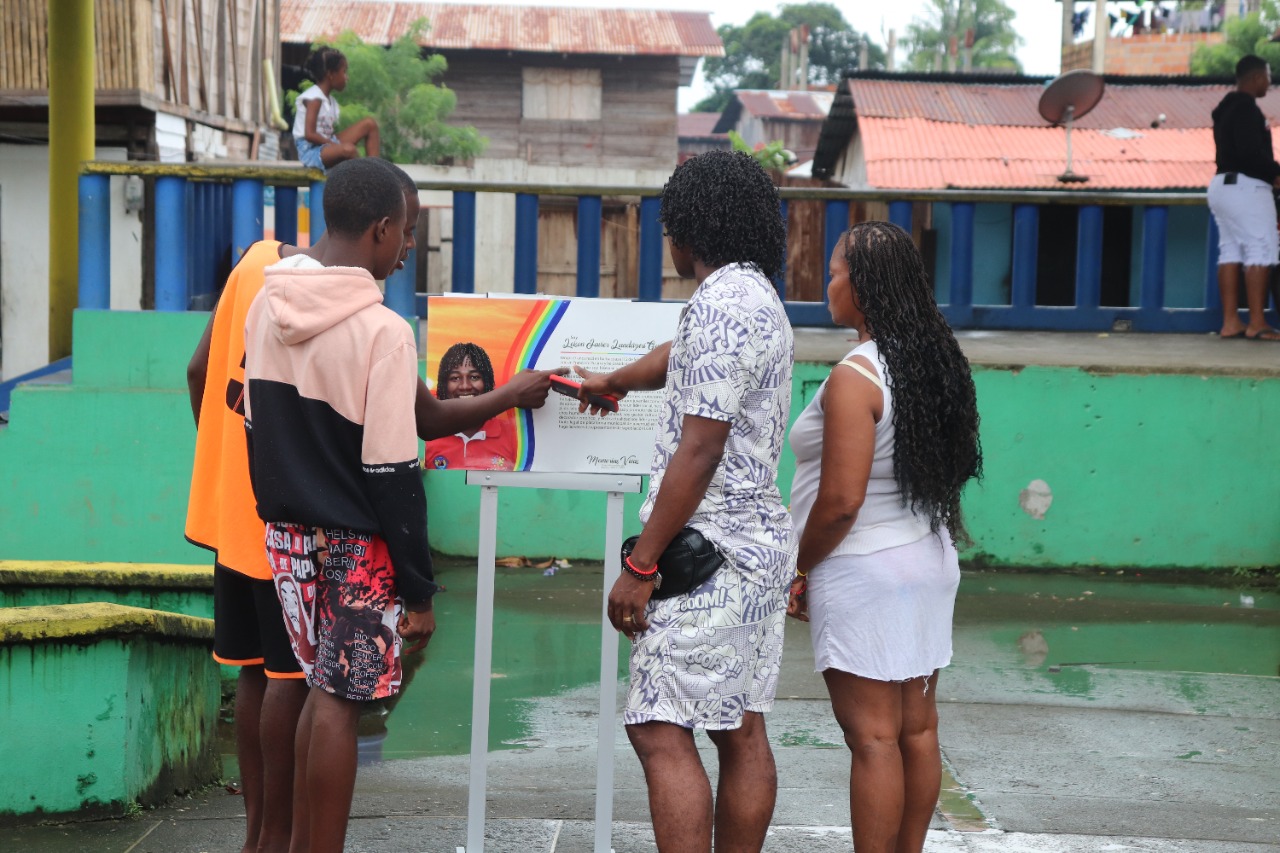
Putting LGBTQI+ Inclusive Development in Action: Awareness, Advocacy, and Allyship
June 9, 2023 | 5 Minute ReadAmidst a mixed global landscape of improved LGBTQI+ rights in some countries and increased discrimination and stigma in others, Chemonics’ LGBTQI+ Inclusion Technical Working Group shares reflections from programs taking action to support and empower LGBTQI+ communities.
Trends in acceptance rates of the Lesbian, Gay, Bisexual, Transgender, Queer, and Intersex (LGBTQI+) community over the past forty years are mixed, with 56 countries experiencing increased acceptance of the LGBTQI+ community and 57 seeing declines in acceptance and backsliding of LGBTQI+ rights. A growing number of initiatives are peeling back the curtain on data gaps that demonstrate the importance of inclusion, including the World Bank’s new Equality of Opportunity for Sexual and Gender Minorities (EQOSOGI) data set initiative to measure and track progress for change, macroeconomic research on the economic case for LGBTQI+ equality, and Open for Business reports on the economic benefits of greater inclusion. However, implementing and replicating practical, evidence-based approaches for LGBTQI+ inclusion remains a challenge for development practitioners. It is one that must be met to avoid leaving people of diverse sexual orientation, gender identity, gender expression and sex characteristics (SOGIESC) behind or exacerbating harms and inequities.
So how can we commit to bold action for LGTBQI+ inclusion in our programs? By sharing examples of successful activities, development practitioners can contribute to the growing body of qualitative evidence on what works to integrate LGBTQI+ inclusion, thus catalyzing collective action towards social progress so that “’Do No Harm’ [is not] misinterpreted as ‘do nothing’” (USAID predecisional draft LGBTQI+ Inclusive Development Policy, 2023). We break down lessons learned to share a three-pronged approach that programs across sectors can implement to ensure people of diverse SOGIESC are not just heard, but empowered to lead transformative change – build awareness, conduct advocacy and commit to allyship.
Lesson 1: Build foundational awareness of LGBTQI+ specific issues based on contextual analyses to catalyze action
Awareness raising of LGBTQI-specific challenges and opportunities is an important precursor to action. This starts with a whole-of-program inclusive development analysis at the outset of implementation; effective programs layer considerations including SOGIESC on USAID’s ADS 205 domains of gender analysis framework to interrogate how intersectional identity factors impact inclusion across program objectives. Analysis findings then must be integrated into all-staff training to ensure staff understand implicit constraints (like social norms and attitudes held by the community on LGBTQI+ rights) or explicit barriers (such as laws or policies criminalizing homosexuality) that can affect inclusion in the project’s context. Programs should then cascade this information into their engagements with external stakeholders to build understanding of how SOGIESC can impact an individual’s ability to participate in or benefit from programming. Awareness raising facilitates action by highlighting potential entry points to advance LGBTQI+ inclusive development appropriately and safely within the socio-cultural context of development activities.
USAID/Ukraine’s Transformation Communications Activity (TCA) recently analyzed media narrative trends related to women and the LGBTQI+ community. Data collected showed that supporters of pro-Russian views considered the fight against LGBTQI+ people as one of the justifications for the “special military operation” in Ukraine and regularly shared hate speech targeting the LGBTQI+ community. Additionally, TCA found that LGBTQI+ led or serving organizations require capacity building and technical assistance to communicate the services they are providing during the conflict. As a result, the activity is actively generating communications highlighting recent cases of LGBTQI+ discrimination and disseminating them to targeted ministries, NGOs, and communities to generate broader awareness of the effects of the conflict on the LGBTQI+ community. Using awareness raising as an entry point for action, the team is supporting local stakeholders to underscore the role of the Ukrainian government and the international community to protect human rights and people of diverse SOGIESC, and providing technical assistance to the National Council of Television and Radio Broadcasting of Ukraine as it implements a new media law and monitors media outlets for hate speech. TCA also supported the Strategic Communications Department of Ukraliznytsia, the state-owned Ukrainian Railways entity, to address terminology and needs of transgender women, resulting in the inclusion of transgender women in Ukraliznytsia’s policies and communications for women-only train compartments. Ukraliznytsia became the first major state-owned company to openly recognize the transgender community and its needs, increasing the visibility of a heavily marginalized group while fostering awareness and dialogue in Ukraine around inclusivity and critical services.
Lesson 2: Leverage evidence and lived experiences to advocate actively for LGBTQI+ inclusion and social transformation
Discriminatory norms and policies that ‘other’ the LGBTQI+ community can negatively affect equitable access to resources, opportunities, and benefits from development programming. Active advocacy that targets interventions to break down unfounded and stigmatizing social norms is vital to support social cohesion. By providing technical assistance, financial support, and capacity strengthening, development programs are poised to design activities that not only increase broad awareness of LGBTQI+ inclusion, but actively advocate for procedural or normative changes in laws, policies, or attitudes of partner institutions and stakeholders.
USAID/Mexico Human Rights Accountability Activity (RED-DH) has effectively used these three tools to advocate for an improved legal framework for LGBTQI+ inclusion. With partner Arcoíris Foundation and in coordination with Mexico’s Attorney General’s office, USAID (through RED-DH) analyzed the legal framework and investigation process for crimes committed against LGBTQI+ persons and produced a proposed National Protocol for the Investigation of Crimes Committed against LGBTQI+ Persons currently being reviewed for publication by Government of Mexico authorities. Civil society consultations in 28 states revealed that case management of enforced disappearances of LGBTQI+ persons was an additional critical issue for the country’s justice sector. With Arcoíris Foundation, the Activity’s continuous advocacy efforts recently culminated in the formal launch of a new guide for the registration and monitoring of disappearances of LGBTQI+ persons in Mexico. Through RED-DH, USAID is strengthening collective action of government and civil society partners to document and register cases of enforced disappearances and implement differentiated approaches to potential perpetrator identification, risk mitigation, and crime reduction. This guide raises awareness and expedites the search for LGBTIQ+ disappearances.
Lesson 3: Commit to active allyship by partnering with LGBTQI+ organizations for safe, sustainable, and locally led social transformation
Organizational allyship commitments that prioritize facilitative partnerships with LGTBQI+ led or serving organizations amplify the leadership role these traditionally underutilized and underserved organizations play in addressing the concerns of the communities they directly support. Chemonics’ recent membership to ILGA World is part of our core commitment to center LGBTQI+ voices within locally led development. Genuine partnerships between development organizations and local organizations elevate expertise that reflects the lived experiences of the communities with whom we work and can dismantle financial and social barriers LGBTQI+ organizations face by unlocking funding and technical assistance.
The USAID/Colombia Migration Management Activity, or Integra, is leveraging Chemonics’ long-standing allyship with fellow ILGA-member Caribe Afirmativo on past programming to advance human rights in Colombia to address needs of Venezuelan LGBTQI+ migrants, returnees, and receptor community members. Integra works with Caribe Afirmativo to apply a gender and sexual diversity focus to Colombia’s migration policies informed by evidence on the diverse needs of the LGBTIQ+ migrant population. With Caribe Afirmativo, Integra has put forth public policy recommendations and toolkit with pedagogical training resources called the “Morral para la Integración” to support stakeholders to meet the needs and secure the rights of LGBTQI+ migrants. Together, Integra has supported Caribe Afirmativo to train over 330 individuals on access to registration, health, education, and justice services for Venezuelan LGBTQI+ persons in Barranquilla, Cartagena, Cúcuta, Medellín and Riohacha and equipped migration centers with tools for providing tailored services to the LGBTQI+ community. Integra’s commitment to allyship also includes strengthening of community based Compazes in Bucaramanga and Fundacion Identidad Despierta Douglas Castellano in Riohacha to combat xenophobia and homophobia, empower LGBTQI+ migrants’ leadership capacity, and defend LGBTQI+ rights. Through its active allyship, Integra is bridging divides between LGBTQI+ migrants and receptor communities, supporting cohesion, and increasing access and equity.
While the process of intentional, transformative social change can be daunting and require efforts beyond the life of development programs, these lessons learned show that practitioners can take action to improve inclusive development outcomes for LGBTQI+ communities globally by embedding awareness, advocacy, and allyship into programs.
Banner Image Caption: USAID/Colombia Human Rights Activity’s “Memorias Vivas” photo gallery highlighting stories from the LGBTQI+ community, which was organized by grantee Fundación Afrocolombiana Arco Iris. The photo was taken by Fundación Afrocolombiana Arco Iris.
Posts on the blog represent the views of the authors and do not necessarily represent the views of Chemonics.

